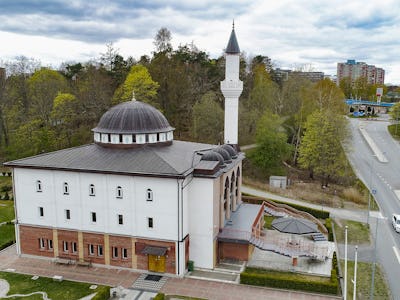“They’re like those bad football fans”
It’s been called the most important election in decades. The coming elections to the European Parliament will take place in May, and some believe it will be a springboard for the parties on the far right. But what would the consequences of that be for the labour markets in the European Union’s member states?

A supporter of German AfD poses near left wing activists (background) in Berlin, Germany, Sunday, May 27, 2018.
EU. “They’re like those bad football fans. They’ll try to demonstrate their power and start chanting slogans any time a decision needs to be made,” says Swedish Social Democrat Marita Ulvskog.
She has served as vice chair of the European Parliament’s Committee on Employment and Social Affairs for five years, and has led the Social Democrats in the parliament for ten.
With the experiences from those years under her belt, she has gotten a lot of insight in how the far-right in Europe reasons on issues relating to the labour market.
At the moment, 7 out of 52 delegates in the committee belong to parties that are considered to be positioned on the far right. Among them are neo-Nazi Golden Dawn from Greece, right-wing populist National Rally and Lega Nord from France and Italy, and fascist Jobbik from Hungary.
Marita Ulvskog says that the far-right members in the committee often stick together when voting. They mostly support propositions from the established conservative parties, but sometimes they’ll vote for left-wing propositions which align with trade union policies.
The far-right parties are often in favour of strong unemployment benefit policies and certain kinds of social welfare reforms.
In Poland, national-conservative government party Law and Justice recently increased child support. In Hungary, Victor Orbán’s government wants to introduce a tax break for women with four or more children, in an effort to encourage women to give birth to more “Hungarian” children.
“They often want to appear to be progressive in matters regarding trade union rights. Meanwhile, they vote very differently to us when it comes to issues concerning women’s rights in the labour market,” says Marita Ulvskog.
In the last few years, several nationalist trade unions have emerged throughout Europe.
In the south of Germany, a few far-right trade unions came together under the name “Patriotic Unions”, which has close ties to right-wing populist party Alternative for Germany.
Their foothold is strongest within the auto industry. IG Metall has actively tried to counter their organisation and so far, the right-wing unions have not been very successful.
Swedish author and commentator Lars Jederlund has been following European politics since the 1990’s and recently released the book Ödesvalet(The Fateful Election), about right-wing parties in Europe.
He explains that it’s a motley crew of parties, with many different outsets. Some are fascists, others religious right-wing fundamentalists or right-wing populists. He places the Swedish Democrats in the group “Ethnocentric right-wing parties”, together with Poland’s Law and Justice and the Danish People’s Party.
Their differences aside, there are some unifying factors.
“They oppose immigration and the EU,” says Lars Jederlund.
If the far right manages to strengthen its position after the election, the number of members of parliament with critical views on issues like free trade agreements will increase, which could affect the labour market.
These parties are also sceptical of the Union’s initiatives to reduce social injustice.
The Swedish Democrats strongly oppose the European Pillar of Social Rights, because the party worry that it will lead to regulations that will affect the Swedish model.
Already today, seven EU member states are led by parties on the far right; Poland, Hungary, Austria, Italy, Slovakia, the Czech Republic, and Bulgaria. Most polls indicate that the right-wing parties will increase their number of seats after the election, while the Social Democrats of Europe are predicted to make a weak election.
Marita Ulvskog explains that the reason for this development is that the European Social Democrats haven’t been as good as these parties at storytelling.
“This, of course, is because we can’t trick people. We have to stick to the truth and they don’t.”
Franziska Schröter, from the German political think tank Friedrich Ebert Stiftung, which has close ties to the German Social Democrats, works with analysing the growing far-right movement.
She says that these political parties put a lot of effort into spreading their message online.
“Here, Alternative for Germany has about 20 employees working with social media to spread the messages of its parliamentarians. The Social Democrats have two.”
“That’s a massive gap. You could say that the established parties are focusing on doing their job and advancing politics while Alternative for Germany are focusing on communication.”
Theres another factor too. Followers of the far right are much more active on social media, and they attack their opponents on the internet.
“They are passionate and they hate,” she says.
“Hate is a much easier feeling to foster than love. To affect others by spreading fear is very effective.”
*Arbetet Global has tried to reach the Swedish Democrats and Golden Dawn for comments.
The extreme right in the five biggest countries of the European Union
Germany. Right-wing populist party Alternative for Germany was founded in 2012 but has grown fast and is now the third biggest party in the country. They are against immigration and sceptical of the EU and are believed to get around 12 percent in the upcoming election to the European Parliament ,which is 5 percentage points more than in the last election.
France. National Rally, led by Marine Le Pen, is predicted to get around 20 percent according to several polls. It’s a few percentage points lower than last election but that will hardly affect the number of seats. The party is predicted to become the country’s second largest.
Italy. Lega Nord and the The Five Star Movement,who are in government together, are predicted to get strong support in the EU election, over 32 and 22 percentage of the votes respectively. The firm support for these two parties is believed to be a contributing factor of how the far right is growing in the EU parliament.
Spain. Until recently, the far right had been remarkably absent in the country, but in 2013, a faction from conservative party Partido Popular went off to form right-wing populist party Vox, which has been growing steadily. The party is predicted to end at up between 8 and 13 percent.
Poland. The government party Law and Order are dominating Polish politics and can, according to predictions, get support at up around 40 percent. At the same time, another party from the right is growing stronger, far-right populist party Kukiz’15. The party was formed by rock musician Pawel Kukiz who is sceptical of the EU and wants to reform the polish election system.
*The UK is currently the third biggest country in the EU but considering the fact that it is leaving the EU it was not included in this summary.
Sources: Politico’s Poll of Polls – European elections 2019, Europaportalen












